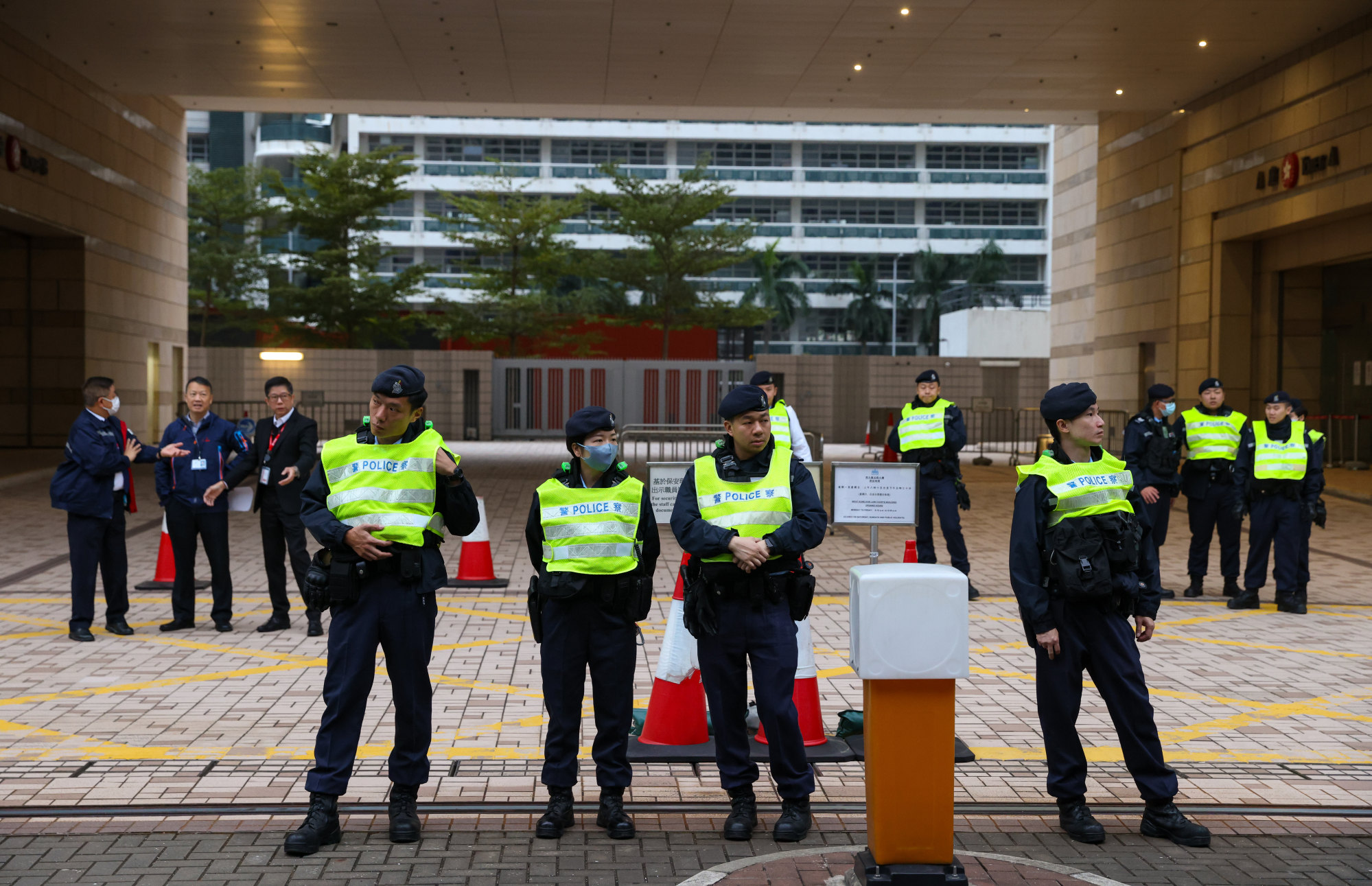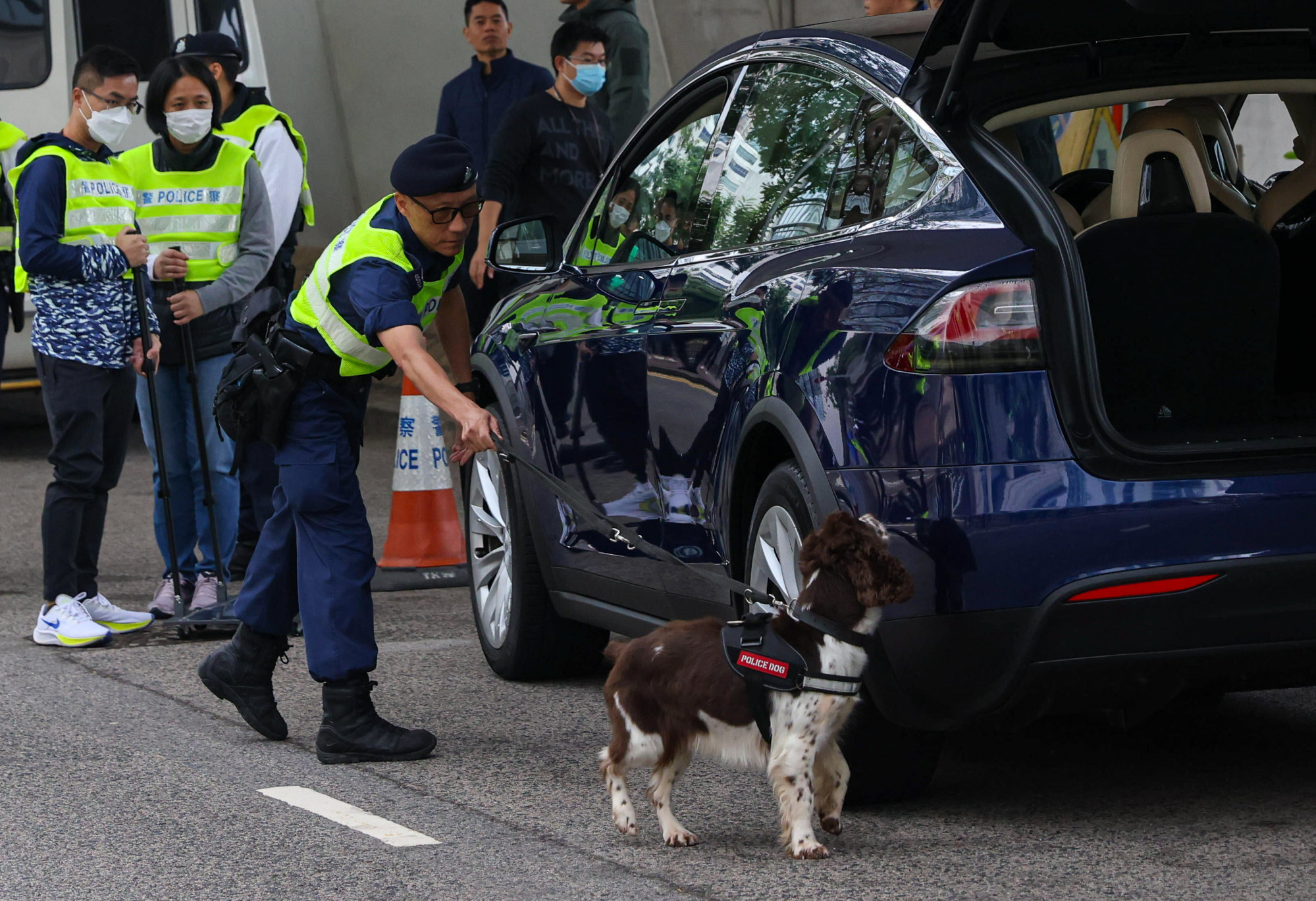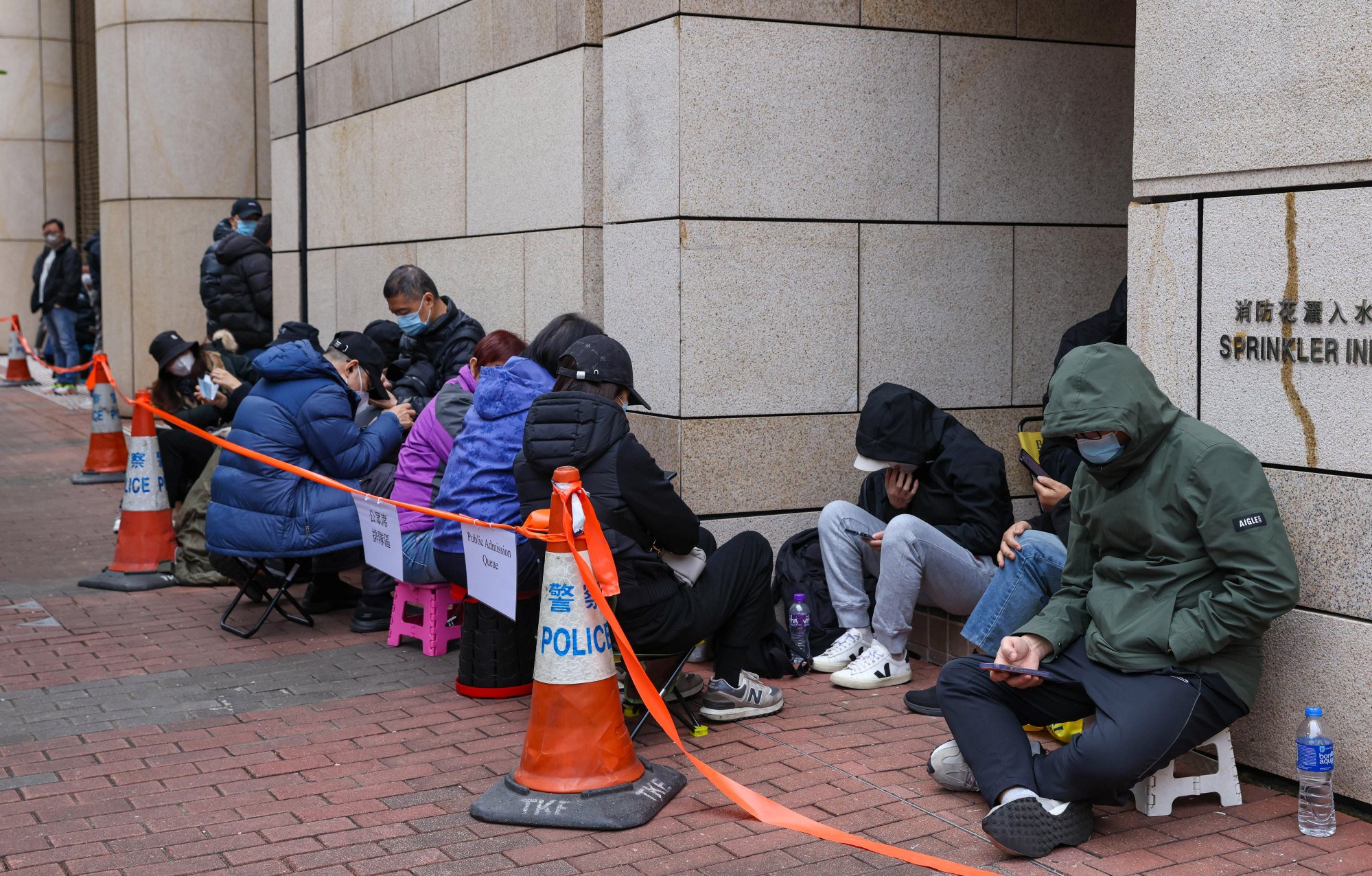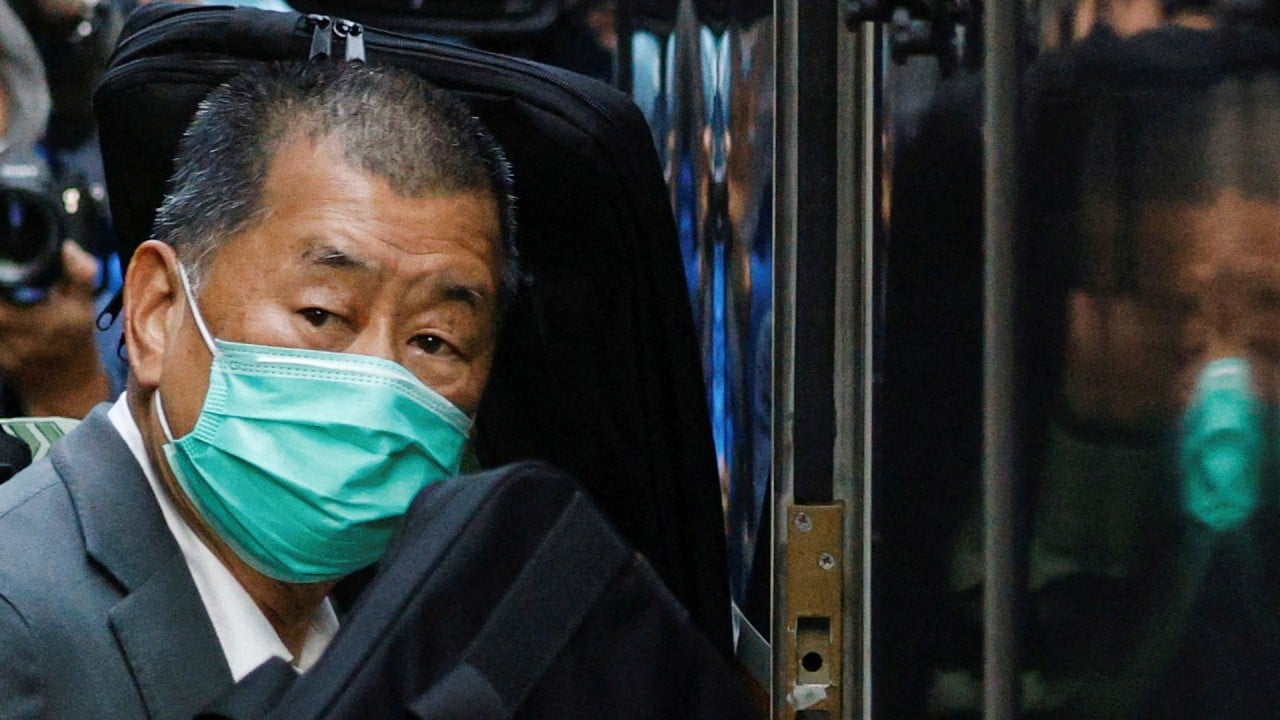
Jimmy Lai’s national security trial: Hong Kong court adjourns case to consider decision on dismissal of sedition charge application
- Three judges adjourn trial to consider decision on sedition charge and will continue case on Friday
- Lai, founder of the now-closed Apple Daily tabloid newspaper, faces three conspiracy charges relating to sedition and collusion with foreign forces
Three judges presiding over the national security trial of Hong Kong media tycoon Jimmy Lai Chee-ying have adjourned until Friday to consider their decision on whether to dismiss a sedition charge against him.
The adjournment came after Lai’s counsel made further submissions on Tuesday in support of an application for the conspiracy charge, involving 161 allegedly seditious publications by the now-closed Apple Daily tabloid newspaper, to be dropped on the grounds that it was filed too late.
Counsel for the 76-year-old tycoon on Monday, the first day of the trial, proposed an interpretation of colonial-era legislation which would require the prosecution to have laid the sedition charge against Lai by October 2019, six months after his first alleged breach of the 1938 law.

The ruling could cause the prosecution to revise their pending opening speech and reconsider how they present their allegations in the next stages of trial, set down for 80 days.
The court debate has so far centred around how the deadline for filing a sedition complaint should be determined.
Lai faces three conspiracy charges related to sedition and collusion with foreign forces for allegedly drawing international sanctions against authorities and inciting public hatred in the wake of anti-government protests in 2019, sparked by a now-withdrawn extradition bill.
The sedition charge is outlined in the 1938 Sedition Ordinance, which was incorporated into the Crimes Ordinance in 1972.
All eyes on Hong Kong media tycoon Jimmy Lai as national security trial begins
The Crimes Ordinance says that no sedition charge should be filed more than six months after the alleged transgression.
Prosecutors have accused Lai of using Apple Daily as a platform for anti-government propaganda from April 1, 2019, just after then-chief executive Carrie Lam Cheng Yuet-ngor proposed a contentious extradition bill, until the newspaper’s closure on June 24, 2021.
Robert Pang Yiu-hung SC, appearing for Lai, on Tuesday said the six-month time limit was introduced to ensure the prompt prosecution of sedition offences while mitigating the restrictions of the legislation.
He argued that the prosecution “must act quickly” on sedition offences as a matter of “public interest” to ensure awareness of permissible content.
Pang said the same time limit would apply to conspiracy charges.
He added that the prosecution should not “sit on their backsides” and “do nothing” when it came across seditious publications and had chosen to pursue a conspiracy charge after the time limit for prosecuting a single seditious act had passed.
Pang also pushed back at the prosecution stance that such an approach would impede their work.
He added that “any particular ‘injustice’ that might befall [them] is really more apparent than real”.
The prosecution, led by Anthony Chau Tin-hang, argued that conspiracy charges in nature were a “continuous” offence, which, in Lai’s case, were said to have covered a 21-month span.
Chau said it would be absurd if prosecutors were required to charge an accused every time an alleged offence came to their notice in the event of a continuing conspiracy involving multiple criminal acts.
He argued that the defence’s interpretation, if accepted, would weaken the prosecution’s ability to file criminal complaints, and would run contrary to the spirit of the national security law that emphasised the “effective” suppression of suspected offences.

Chau also stressed that each allegedly seditious publication from the accused could on its own be regarded as being “continuously made available to the public”, noting that Apple Daily had not removed such content before its shutdown.
On a separate note, Chau said that the starting point for a prosecution should not depend on when the defendant first showed up in court to have the charge read to him, but on when information about the criminal complaint was laid out.
Pang on Monday argued that Lai’s prosecution for the sedition offence did not “begin”, the word used in the provision laying down the time limit on prosecuting sedition offences, until the charge was read to him in court on December 28, 2021.
Based on this understanding, prosecutors were still four days late in making the allegation even if the deadline for filing the charge was found to be six months after Apple Daily’s closure, he said.
The lawyer sought to distinguish “begin” from its synonym, “institute”, a word commonly found in other city laws, in suggesting the legislature had deliberately given the former a special meaning to the effect of requiring the defendant’s appearance in court.

Chau contended a day later that the two terms had the same textual meaning and stressed his team had fulfilled the statutory requirement of “informing” the court and parties about its decision to level the sedition charge by way of correspondence on December 14, 2021.
The presiding judges – Madam Justices Esther Toh Lye-ping and Susana D’Almada Remedios and Mr Justice Alex Lee Wan-tang – are expected to hand down their ruling on Friday morning.
Lai returned to court amid a heavy police presence on the second day of the trial, but public interest in his case appeared to have subsided, with multiple empty seats in the court’s public gallery during the two-hour sitting, unlike Monday when it was packed with observers.

Chief Superintendent Steve Li Kwai-wah of the National Security Department attended Tuesday’s hearing, sitting at the back of the court behind prosecution lawyers.
Outside West Kowloon Court, the same level of police presence seen on Monday was evident from the early hours as dozens of armed uniformed and plain-clothes officers and search dogs remained on guard. A prison van carrying Lai arrived at the court well before 8am.
Legal team for Hong Kong tycoon Jimmy Lai argues time’s up for sedition charge
Some foreign consulate representatives arrived at around 9am. Isidor Nikolic, the deputy consul general of Austria, was the first to show up, followed by Sapphire Le Sage, political and communications head at the British consulate.
At least 10 consulate representatives, including those from the United Kingdom, United States, Australia, New Zealand, Canada and Switzerland, attended the first day of the trial.
Lai’s wife Teresa Li-Lai Wan-kam, son Augustin Lai Zhun-yan and daughter Claire Lai Choi were back in the court’s public gallery on Tuesday morning.
Lai, wearing the same grey blazer he wore on Monday, appeared to smile and throw a kiss to his daughter after he stepped into the dock and saw his family.
Jimmy Lai trial: timeline of Hong Kong media mogul’s arrests and court appearances
There was noticeably less media presence on Tuesday. Reporters and camera crews – mostly from local outlets – began to gather at the designated press zone at 7.45am. Police officers outside the court building outnumbered journalists.
People began queuing for a seat early in the morning, with several officers standing guard nearby.
About 30 people were there shortly before 7am, with more arriving after 8am. Most of the attendees were middle-aged and elderly people.



